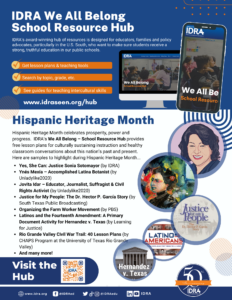• By Christie L. Goodman, APR, Fellow PRSA • IDRA Newsletter • September 2023 • 
We were in a gathering of teachers, students and parents talking about ways to give students culturally sustaining schooling. Students presented their advocacy work to get Mexican American Studies offered in their high schools (see Page 3). They described what it had meant for them to learn about the powerful history of their community and to “not feel erased,” as one student stated.
Committed teachers shared how they had to scramble to prepare to teach ethnic students for the first time. They appreciated the chance to share ideas with each other.
Everyone turned their eyes to the screen as someone navigated to a website. With Hispanic Heritage Month coming up, the mouse clicked on a classroom lesson, “Jovita Idar – Educator, Journalist, Suffragist & Civil Rights Activist.”
“Oh yes. My students loved this lesson,” said one experienced teacher.
Jovita Idar was a teacher, journalist, nurse and civil rights activist who grew up in Texas and endeavored to expose segregation, lynching and other injustices endured by Mexican Americans in the early 20th century.
Complete with a video, discussion questions, vocabulary, a political cartoon analysis activity and another on the U.S.-Mexico Border, the lesson about Jovita Idar was developed for PBS by Unladylike2020, an IDRA partner. The lesson materials are in English and Spanish.
A teacher described how he used the lesson in his Mexican American Studies class. He said he paused the video a few times as students reflected on what they were seeing and how it connects to their community today.
“The actual [Real World] lesson is the magic… Topics like that engage students because they’re real and relevant.”
– Teacher focus group participant
This resource is one of many on IDRA’s award-winning We All Belong – School Resource Hub. The hub features over 120 lesson plans, instructional best practices and historical resources to support teachers in delivering culturally-sustaining classroom lessons.
“We designed our School Resource Hub to help educators feel supported in their work to prepare students to be able to think critically so they can succeed in college and beyond,” said Celina Moreno, J.D., IDRA President and CEO. “Students are not naïve to the world around them, and they want their teachers to help them open their eyes to history and to the world, not whitewash them.”

In today’s climate of classroom censorship, teachers in all grades and subjects still have a job to do to provide accurate and inclusive education for their students. IDRA developed the hub by first listening to teachers and students who want lessons on history and current events about race and gender and to help provide context to discrimination they have experienced.
Within these lessons, IDRA created a set of innovative original classroom lessons using a new “America Is Me” (AIM) framework for teaching intercultural skills: solidarity, social awareness, social-emotional wellness, sociocultural exchange, and social change. These skills are transferable across academic content areas.
A high school student focus group unanimously praised the lessons and expressed regret they had not had these lessons in school earlier. Feedback from teachers has been overwhelmingly positive. In focus groups, teachers who used AIM lessons in their classrooms validated the framework and praised how the lessons positively engaged and impacted their students.
Teachers can apply the framework to the federal, state and district standards to foster student engagement. Sample AIM lessons include:
- The Real World: Understanding the Difference Education Makes – This middle school lesson offers students an opportunity to understand how higher education is linked to higher weekly incomes and how income impacts an individual’s quality of life.
- CulturED Collection #1 – #GotCulture?: A Lesson on How Culture Shapes Us – In this high school lesson, students are introduced to important elements of culture. They come to understand how culture shapes the way we see ourselves, others and the world.
- Yes, She Can: Malala Yousafzai – In this elementary lesson, students learn about Malala Yousafzai’s efforts to ensure young girls have access to education and fair treatment. Students make connections between her work and concerns in their communities and present a one-minute speech about their issues. 
Dr. Kelly N. Ferguson and Dr. Marlon C. James, Equality and Equity Group, LLC, developed the AIM framework and lessons for IDRA. And IDRA has created modifications for emergent bilingual learners for each of the AIM lessons.
Development of the We All Belong – School Resource Hub was generously supported by the Charles and Lynn Schusterman Family Philanthropies. IDRA is continually adding lesson plans and resources to the site. Educators can find them through the hub’s search filters by subject, topic, resource type and grade. IDRA also offers training for educators on using the hub and walking through featured lessons. The site includes a Google Translate toggle button and has a comprehensive accessibility feature.
Christie L. Goodman, APR, Fellow PRSA, is IDRA’s director of communications. Comments and questions may be directed to her via email at christie.goodman@idra.org.
[©2023, IDRA. This article originally appeared in the September 2023 edition of the IDRA Newsletter by the Intercultural Development Research Association. Permission to reproduce this article is granted provided the article is reprinted in its entirety and proper credit is given to IDRA and the author.]


